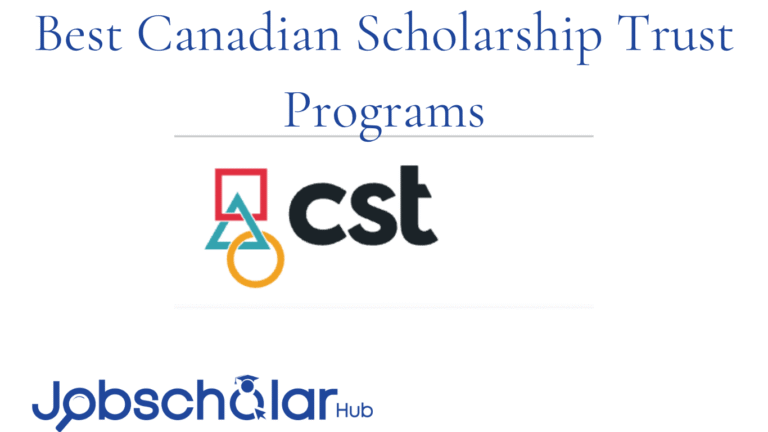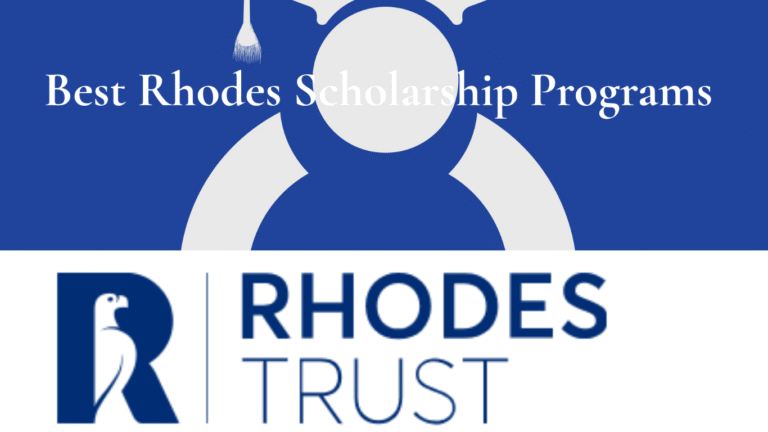If you thought scholarships are only for recent high school grads or traditional college students, think again! Non-traditional students — people who have to juggle a job and kids, military veterans — can struggle with unique hurdles that can make paying for an education seem like an insurmountable challenge.
But what if I told you there’s a wealth of scholarship opportunities targeted specifically for non-traditional students like you? The best part? A lot of these scholarships are off the radar, just waiting to be found.
So in this guide, we’re going to reveal the 7 hidden scholarship opportunities you most likely aren’t even thinking about that could literally change your college experience. So, get ready, because the universe of financial aid is much larger than you think — and it’s time to check out options you didn’t even know were out there.
Table of contents
- Who are Non-Traditional Student?
- Hidden Scholarships You Never Knew You Could Apply For as a Non-Traditional Student
- The Jeannette Rankin Women’s Scholarship Fund
- The Milspouse Scholarship Program
- The Return2College 2025 Scholarship
- The Adult Students in Scholarly Pursuits (ASSP) Scholarship
- The AARP Foundation Women’s Scholarship
- Pat Tillman Foundation Scholarship
- Adult Student Scholarship – Imagine America Foundation
- The Returning Adult Student Scholarship
- The My Career Advancement Account (MyCAA) Scholarship
- Adult Learner Challenge Scholarship (Cappex)
- The ASIST (Adult Students in Scholastic Transition) Scholarship
- How to Find Hidden Scholarships Like These?
- How to Increase Your Chances to Non-Traditional Student Scholarship
- What Are Some of the Biggest Misconceptions About Non-Traditional Student Scholarships?
- Conclusion
- Frequently Asked Questions
- References
- Recommendations
Who are Non-Traditional Student?

Non-traditional students are people who don’t take the customary route of jumping into higher education immediately after graduating high school. This group encompasses a range of students, including:
- Adult learners who have left school and returned for work, family or other personal reasons.
- Parents who are juggling school with caring for kids.
- Service members transitioning from military to civilian life and pursuing education.
- The new first-generation college students who could be going through the process without a lot of family guidance.
- Employees wanting to advance in their careers through additional degrees or certifications.
These students have different struggles that traditional students may not. Balancing school with work or parenting can be challenging, and non-traditional students are usually doing both. Scholarships for non-traditional students/older students are the answer to this problem, as they are able to relieve students from the financial burden making education more desirable.
Most scholarships tend to target a younger, traditional demographic of students, so non-traditional students may sometimes feel a bit neglected. This is why it’s so important to search for scholarships designed for these types of unique scenarios. You may be eligible for scholarships that consider your life experiences, challenges, and goals; scholarships you did not even know existed!
RELATED POST: Tips on Securing Scholarship at Oxford University
Hidden Scholarships You Never Knew You Could Apply For as a Non-Traditional Student

Now, let’s explore scholarships that are perfect for non-traditional students that aren’t on the radar! This often-overlooked source of funding can be a game changer. Here’s a rundown of some of the most unusual ones to be aware of:
The Jeannette Rankin Women’s Scholarship Fund
Website: Rankin Scholars
Amount: Up to $2,000 per year
Eligibility: Women who are 35 or older, low-income, and seeking technical or vocational education, an associate degree or bachelor’s degree.
Requirement: Applicants must demonstrate financial need and submit academic transcripts and a personal essay.
Why It’s Great: This scholarship is for women who are going back to school after major life changes, like starting a family or working for quite some time.
The Milspouse Scholarship Program
Website: National Military Family Association
Amount: 500$ – 1000$
Who can apply: Military spouses who are beginning undergraduate or graduate studies.
Requirement: Military spouse status, enrollment proof, personal statement, letters of recommendation.
Why It’s Great: It’s aimed at military spouses, who tend to relocate frequently and may struggle to find consistent educational opportunities.
The Return2College 2025 Scholarship
Website: Return2College
Amount: $1,000
Eligibility: U.S. residents who are age 25 and older and returning to school after a break.
Requirements: A brief essay explaining why you are going back to school and what your educational goals are.
Why It’s Great: This scholarship is directed at people who have been out of school for a few years and who are looking to continue their education.
Read: Best Canadian Scholarship Trust Programs
The Adult Students in Scholarly Pursuits (ASSP) Scholarship
Website: ASSP Scholarship
Amount: Varies (typically $1,500 – $2,000)
Eligibility: U.S. citizens ages 25 and older pursuing their first undergraduate or graduate degree.
Requirements: Academic history, community service documentation, personal essay, and recommendation letter
Why It’s Great: This scholarship is designed to support adult learners who are dedicated to completing their education and giving back to their communities.
The AARP Foundation Women’s Scholarship
Website: AARP Foundation
Amount: $2,000
Who Can Qualify: Women ages 50+ who are seeking post-secondary education or vocational training.
Requirements Include: financial need, a personal essay and proof of enrollment.
Why It’s Great: It focuses on older women who want to further their education, often after a career shift or a life experience.
Read: Top Graduate Program Scholarships
Pat Tillman Foundation Scholarship
Website: Pat Tillman Foundation
Amount: Issued for up to $10,000 a year
Who’s eligible: Military veterans or spouses seeking undergraduate or graduate degrees.
Requirements: A challenges of facilities to receive military service.
Why It’s Great: Named for the Army Ranger and NFL player who died in combat, this prestigious scholarship awards considerable financial support to veterans and their families.
Adult Student Scholarship – Imagine America Foundation
Website: Imagine America
Amount: $1,000
Eligibility: Adults who are enrolling in a participating career college or vocational program.
Requirements: Enrollment verification, personal statement and proof of financial need
Why It’s Great: This scholarship is geared toward adult students looking to change careers and attend a career-focused college.
Read also: Best NMSC Scholarship Programs
The Returning Adult Student Scholarship
Website: Scholarships. com
Award Amount: $1,000
Eligibililty- This scholarship is for adult learners who are returning to college after taking a break for a minimum of two years. To qualify, applicants must be enrolled in a full-time course of study at an accredited college or university and show a strong commitment to their academic and career goals.
Why You Should Apply: This scholarship acknowledges the struggles adult students face returning to school, balancing family, work and school. It’s a simple application process making it open and valuable to someone who has stepped away from an education.
The My Career Advancement Account (MyCAA) Scholarship
Website: MyCAA
Amount per student: Up to $4,000 for education and training
What You Need to Qualify: This scholarship is targeted at military spouses working toward an education and training program that is relevant to their careers. MyCAA is for spouses of active duty service members who want to become financially independent or develop their careers.
Why You Should Apply: This scholarship is a treasure trove of financial support to you if you’re a spouse of an active-duty service member. It provides substantial assistance to support military spouses in obtaining an education, which will ultimately help them with their career and financial future.
Adult Learner Challenge Scholarship (Cappex)
Website: Cappex – Adult Learner Scholarship
Award Amount: $1,000
What You Need to Qualify: This is open to non-traditional students of all ages returning to college for a degree. You should be 25 years old and have at least two years of a documented break from your education. Scholarships are awarded based on academic prowess, financial need, and the clarity of your vocational goals.
Why Should You Apply: Cappex is one of the biggest scholarship search websites, and its Adult Learner Scholarship is great for a student who has taken some time off school. It’s easy to apply for and a good way to ease the financial strain of returning to school.
The ASIST (Adult Students in Scholastic Transition) Scholarship
Website: ASIST Scholarship
Award Amount: Up to $1,000
What You Need to Qualify: The scholarship is sponsored by the National Association of Adult and Continuing Education. It’s aimed at people who for whatever reason have fallen out of school and want to come back and finish. The scholarship is open to applicants enrolled in an accredited postsecondary institution or accepted as a full-time student with financial need and high academic potential.
Why You Should Apply: This scholarship is meant for adult learners navigating situations that could affect their academic or career goals. If you’re returning to school after a couple of years out of the workforce, whether it’s due to unemployment, raising children or caring for a family member, this is a good scholarship to apply to.
RELATED POST: Tips on Securing Harvard University Scholarship: Full Guide
How to Find Hidden Scholarships Like These?

Although these scholarships are less well-publicized, there are multiple ways you can learn about more opportunities:
Search Scholarship Databases
Websites like Fastweb, Scholarship.com, and Niche all provide in-depth scholarship searches that may include niche categories targeted at non-traditional students.
Tap Alumni Associations
Check with your university and any professional organizations where you have connections—many have exclusive scholarships for their alumni.
Reach Out to Local and National Organizations
Many non-profits, community centers, and advocacy groups offer scholarships aimed at students who meet criteria, such as being a parent, veteran, or working professional.
RELATED POST: 79 Best Scholarships for High School Seniors in 2025
How to Increase Your Chances to Non-Traditional Student Scholarship

Below are several actionable strategies to set yourself apart:
Leverage Your Life Experience
For non-traditional students, they usually possess a lot of life experience. If you’ve been in a career for years, raised children or served in the military, these experiences can distinguish you from other applicants. Make sure to describe these life experiences in your personal statement because they illustrate your perseverance, work ethic, and maturity.
Tip: In writing your essays, focus on how your experiences have led to your goals, and how education will help you do even more to advance those goals. Demonstrating where education falls in your long-term plan is vital.
Write A Strong Personal Statement
This is your opportunity to tell your own story in a way that may connect with scholarship committees. Many non-traditional students might feel like they don’t fit the mold, but this is exactly why your story matters so much.
Tip: Be authentic about your journey, the reasons you’re coming back to school, and the obstacles you have overcome. Don’t just talk about the academics—show how your experiences make you a unique, strong candidate. Use it as an opportunity to persuade why you are worth more than anyone else who applied for the scholarship.
Highlight Transferable Skills
It’s likely that your work and life experiences have provided you with valuable skills that you can use in your studies, even if you’ve been out of school for some time. Whatever the key skills are, such as leadership, communication, problem-solving, or time management, look for skills that will make you a good candidate.
Tip: Highlight these skills on your application. If you’ve balanced work and family, emphasize your time management skills.
Use Letters of Recommendation Wisely
Scholarships typically need letters of recommendation, but those letters can be a useful weapon. Non-traditional students might not have academic references, so focus on collecting letters from employers, mentors, community leaders, or anyone else who can testify to your character, work ethic, and determination.
When sending prompts, be specific. Inform your recommenders what the scholarship is for and provide them with a few bullet points you’d like them to hit. A good personalized letter of recommendation can send you a long way.
Be sure to meet all requirements, and go the extra mile
While it might be obvious, you need to meet every single eligibility requirement. Sometimes, it’s because applicants have failed to include an incidental detail — like an additional essay, or a certain form. Don’t let this happen to you!
Tip: Create a checklist of all of the scholarship requirements, and don’t be afraid to ask for clarification if something seems unclear. If you’re unsure, reach out to the scholarship provider to check if there’s something additional you can do to enhance your application.
RELATED POST: University of Ottawa Scholarships 2025
What Are Some of the Biggest Misconceptions About Non-Traditional Student Scholarships?

“Scholarships are for Young, Traditional Students Only.”
Many non-traditional students feel they’re above the age limit for scholarships. The truth is, there are a number of scholarships available that are tailored for older students. There are great opportunities available for students of all ages, from women going back to school after raising children to veterans who continue their education.
“You Can’t Qualify Unless You Have a 4.0 GPA.”
Academic excellence is a must have, but non-traditional scholarship students do not always need excellent grades. There are many scholarships that account for life experiences, career advancements, and community involvement, meaning you might qualify without a perfect GPA.
“Scholarships Are Way Too Competitive, It’s Never Gonna Be Worth It.”
It’s common to think there’s not much point in applying, as you assume the competition will be too strong. Some of the scholarships are competitive, while others have very few applicants and are therefore easier to get.
“Some Non-Traditional Students Are Too Financially Secure.”
While financial need plays a role in many scholarships, there are also many that are based on merit, life experience or other specific goals. Non-traditional students are often in unique, and demonstrate drive and determination that scholarship committees love.
“You Can Only Get Scholarships Before You Go to School.”
Most non-traditional students are under the impression that they need to apply for Scholarships before signing up for their courses but that’s not true. Scholarship applications are available at all levels of your education (even for those who are already enrolled).
There are some scholarships aimed for students currently enrolled in school or those who want to return after a break. The secret is to look all year and apply as you find openings.
RELATED POST: UCL Global Masters Scholarships In The UK 2025 (Funded)
Conclusion
If you are a non-traditional student, you might want to seek aid other than scholarships that would mean your education would not be overburdening. From federal aid and state grants to employer tuition assistance and crowdfunding, there are thousands of possibilities.
Taking the time to go through all the options, and ensuring that all the criteria are met, means that non-traditional students can access the funds they need to study successfully and graduate with confidence. So, do not put all your eggs in the scholarship basket, but diversify your strategy to secure funding that meets your needs.
RELATED POST: Top scholarships for international students in Canada Today
Frequently Asked Questions
Yes, you can mix and match a scholarship, grant, loan, and work-study, as long as you meet eligibility requirements.
You will be able to track your applications via FAFSA, state portals or individual scholarship and grant program websites.
No. Most financial aid programs don’t have age requirements, provided that you meet other eligibility criteria.
Explore other private loans, work-study programs or employer tuition aid to fund your education.
References
- fundsforindividuals.org-The best Scholarships for Non-Traditional Students
- bold.org– Scholarships for Non-Traditional Student
- usnews.com– Best colleges with Scholarships for Non-Traditional Student






